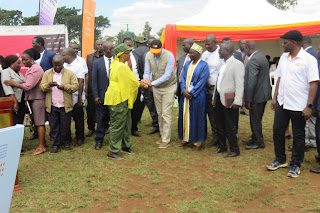UNFPA Urges Government to implement the Obstetric Fistula Strategic Plan
By Umar Weswala
 |
| Mr. Dan Alemu from UNFPA |
This
was contained in a speech read for her by the UNFPA Deputy Country
Representative Mr. Daniel Alemu during the national commemoration of this year’s Fistula day yesterday in Hoima City.
The
National Obstetric Fistula Strategic Plan 2020/2021 - 2024/2025 was launched during
last year’s commemoration of the Fistula Day in Zombo District by the State
Minister for Health in Charge of General Duties Hon. Anifa Kawooya.
In
her remarks, Dr. Mary Otieno stated that much as significant progress has been
made by government and partners, more needs to be done to eliminate Fistula by
2030.
According
to the UDHS 2016, at least 1 in every 100 women has obstetric fistula in
Uganda.
Women
who suffer complications of fistula are likely to lose not only their babies
during child birth but also their livelihoods and sometimes their lives.
According
to Dr. Mary, ending obstetric fistula is a high priority for UNFPA and a must
achieve target of the Sustainable Development Goals (SDGs).
“As
UNFPA, we have invested in improving the quality of maternal care to make every
child birth safe. We have also invested in reducing unmet need for modern
contraception. Going forward, we must accelerate our progress toward ending
this preventable condition” she noted.
As
the leader of the global campaign to end Fistula, Dr. Mary said UNFPA remains
committed to support the government of Uganda to end Fistula by 2030.
 |
| Minister Kawooya greets UNFPA's Dan Alemu |
Speaking
on behalf of the Prime Minister Robinah Nabbanja, the State Minister for Health
in charge of general duties Anifa Kawooya commended UNFPA for the partnership
and cooperation with the government as well as its lead role in the campaign to
end Fistula by 2030 in Uganda.
She
noted that fighting fistula should start with a fight against harmful practices
like child marriage, teenage pregnancies and school drop outs. These she said push
girls into early child bearing which puts them at a high risk of developing the
debilitating condition of obstetric fistula during child birth.
 |
| Anifa Kawooya represented the Prime Minister Nabbanja |
As a champion advocating for the prevention of teenage pregnancies in the country, I urge the young girls here to focus on their education, stay in school and acquire skills because it is the surest path to empowerment and the realization of your full potential” Nabbanja stated in her speech that was read by Minister Kawooya.
The
Prime Minister also cautioned men against abandoning their partners who are
battling with fistula.
“I
appeal to the men here. You know that you are involved in the cycle of life. Please
support your wives not just during conception. The women have testified how you
run away from them. When she came, she was with you and she did the right thing
with you, now remain together until death separates you” Nabbanja noted.
In
2022, about 1700 fistula repair surgeries were done across the country, but
according to UNFPA, much more needs to be done to clear the backlog and prevent
more cases from happening.
At
the moment, Uganda still has an unmet need for prevention and holistic fistula
treatment which includes surgical repair, social re-integration and
rehabilitation.
 |
| Shakillah speaking to a UNFPA staff |
According
to Namono Shakillah a Clinical Officer at Kagadi Hospital and the head of the
fistula camp, most of the women who were diagnosed with fistula are young
mothers whose bodies are not ready for child birth.
Some
of the women who were repaired have lived with the condition for decades.
Mawazo
Jackline, a 49 year Congolese Refugee from Kyangwali Refugee Settlement can now
afford a smile after 26 years of suffering with the debilitating fistula condition.
She is one of the 13 women who were successfully repaired at Kagadi Hospital and will soon be discharged.
 |
| Jacline can't wait to return to her garden |
For
Jakeline, the long and uncomfortable wait before accessing fistula care was
indeed a wait of pain.
“I
have endured a lot of stigma and rejection but I thank the doctors for treating
me. I can’t wait to get back to my garden” Jackline said.
Jackline’s story shows that fistula can be eliminated if those with the condition can access timely and quality medical care. Her long and painful wait however, is a pointer to the existing gaps in the provision of quality care in the health system and indeed another reason why government and partners should invest in the implementation of the National Obstetric Fistula Strategic Plan.



Comments
Post a Comment